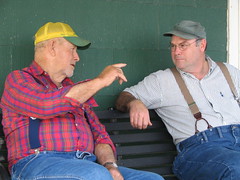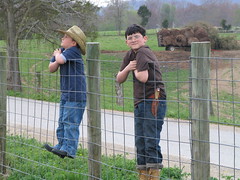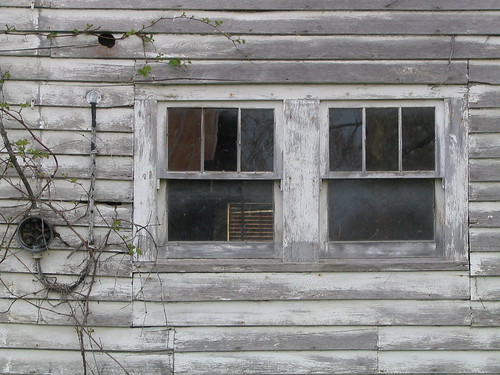That decision would have been part intuition, part connective, part necessity. "There is water in the spring, abundant plants and animals: Let us live here." They hunted or had all they needed in the woods and creeks. They worked and cleared the land and became a part of it--eventually they farmed. They built crude cabins and sometimes moved on, leaving them there for someone else to find and inhabit. What they didn't have, they didn't need.

This is our fourth visit to Kentucky in a year. When we came down last April we were on an exploratory mission--part tourists, part investigative reporters. We wanted to visit various places we had heard about and talk with people around the state. Things seemed to link together--almost effortlessly in retrospect--until we found ourselves here a year later even more certain of our choices. We saw three farm places last year with a realtor: two in Casey County outside of Liberty and another in Pulaski County. All are in Knob country in south central Kentucky, between the higher Appalachian mountains in the eastern part of the state and the flatter beginnings of prairie to the west. Here gently rolling hills stretch into large open ridges, where pastures and woods taper down to hollows with stone-lined creeks.
The third place was a charm. Part ridge, part bottom, we loved the peace and quiet, the meandering creek, two pastures and woodlands, and the one car an hour average past the property (if that). A month later we came back to buy it. We soon met our neighbors on one ridge and on this visit met others. While we are still finding our way down here, we feel that each direction we have taken has been positive and productive--like a trail of crumbs has been left out for us and we are finding them with no trouble before the vultures descend. Sometimes the way should be this easy, even if we do happen to rely on a trusty Kentucky gazetteer kept handy in our car and an inner compass for true north (more or less).

We visited our land many times this week amidst warm spring weather and shared it with our boys for the first time since we first looked at it a year ago (our teenage daughter said she will come down when we get our house built). Wildflowers have been in the woods and hollows in abundance: may apples, banks of white and pink trillium (the occasional purple one), emerging bloodroot, clutches of wild miniature iris, and other flowers I'd never seen. Cardinals and blue birds dart back and forth across the fields and road sides. Cattle bellow across the pastures.

The boys found rocks and geodes as they waded in the creek while I met with a neighbor in the hollow who is trying to identify the remnants of a kitchen garden. He showed me what a wild onion looks like and where a patch of strawberries has gone wild. My husband toured the land with several people to talk about projects and to learn more of its history. There is a quiet and serenity here--far removed from any major road or highway (we are two miles from a narrow state road)--that my husband and I have rarely experienced in our own rural backgrounds.

Today I walked up to our land with our neighbor Margaret, down a dirt road from their farm and about half a mile across the ridge. We went to the rise of field which forms part of our north boundary along their farm. "I've lived on this ridge for 53 years and I've never stood in this field!" she said. Having worked their own fields, of course, and growing up on a farm on a nearby ridge, she would have never thought to come here without permission or a need to do so. The cabin once on our land in the hollow had long ago been dismantled and taken away--only three barns are there to remind anyone that this was once a home place. The top of the ridge, in the field where we stood, has no signs of habitation apart from an open pasture. As long as Margaret has been living on the ridge, there has not been another woman or family on this land to visit.

I asked her where she would put the house--she showed me the same spot I have been thinking about, on the highest part of the field facing southwest towards the breezes and fullest light, with a porch on the front and a small kitchen ell off the back (in true Kentucky cabin style). We could see with the emerging leaves on the trees that you could just catch a glimpse of their farm to the northeast. I agreed with her choices and we spoke about the right spot for a garden, a barn or two, and the boys raising calves. We walked back the half mile to their farm and Margaret picked a yellow flower that she had never seen before. In her own kitchen off the back of her house, she placed it in a small cup of water. "I like to put flowers on my kitchen window sill because I like to look at them," she said. [In her garden near the house she grows potatoes, corn, beans, zucchini, and sometimes beets, which she pickles to perfection. And lots of flowers.] We talked about recipes and how we tried to make more time for handwork (she crochets, I knit). I was glad she could share some time with me before she had to do the evening's milking with her son Frankie, who often helps her.
Elza, Margaret's husband, grew up in the home place just down from their present farm house, which they still own but that hasn't been inhabited since earlier in their marriage. One interesting thing about this part of the world is that when farms are bought or people move out of old houses, the structures are often just left there, abandoned--houses, barns, sheds, outhouses. Often new houses are built nearby while the old ones are just left there for nature to reclaim them. This is not a part of the country where there are gee-gaw houses and suburban cul-de-sacs. In earlier days, when Kentucky was wilderness, it was not unusual for settlers to move on and for another family to either move in or salvage the materials for their own cabins. Now these structures and their stray gatherings of outbuildings are rural ruins, unintentional follys in the landscape. There is a melancholy, even poetic beauty, in their decay and yet I can't imagine the land here without these former home places. I suppose it is better that they remain this way--if not to be restored--than to be torn down and forgotten entirely. In this condition of benign neglected state of preservation they are at least reminders of another time, of other settlements and people. Now they are scattered ghost houses on the land.
After our walk, and when Elza and Frankie returned with my husband after a tour around the land, Margaret surprised our youngest son on his seventh birthday with a cake and ice cream. Much to their delight, Frankie took the boys on several rides around the farm on the four-wheeler that he uses to herd cattle and for farm work. A few days before Margaret invited us in to a delicious supper of ham, cornbread, creamed corn, beans, fried potatoes (all from her garden) and fried apples. She had prepared that meal in no time at all after milking over 60 cows at the end of the day. We feel blessed by their kindnesses and we have yet to even build our house. We have rarely felt more welcomed.

Daniel Boone wrote in an account of 1771, when Kentucky was indeed a frontier: "I returned home to my family, being determined to bring them as soon as possible at the risk of my life and fortune, to reside in Kentucky, which I esteemed a second paradise." Our neighbors have lived all of their lives on this ridge or the adjacent one, seldom leaving because of the responsibilities on their farm. Frankie said that he has been many places but whenever he has been away, he has always wanted to come back. Elza cautioned that we would soon be homesick for Kentucky and that once we got settled we would never want to leave. After our recent visit here this week I am beginning to understand why. When some where starts to pull on you, that is where you should be.


1 comment:
Hi. I came to your blog via the hip mama's blog roll... I was instantly drawn in by several of your photos and your words in this post. absolutely beautiful, I found me feet aching to walk some lucious kentucky acerage myself!
Post a Comment